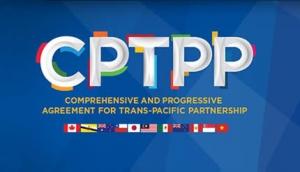
On the 15 December the UK officially joined the Comprehensive and Progressive Agreement for Trans-Pacific Partnership (CPTPP) as a fully-fledged member, potentially boosting the UK economy by £2 billion a year in the long run.
CPTPP is a major trade bloc whose members - Australia, Brunei, Canada, Chile, Japan, Malaysia, Mexico, New Zealand, Peru, Singapore, Vietnam, and now the UK – have a combined GDP of £12 trillion.
The UK’s accession is estimated to benefit all UK nations and regions in the long run, relative to 2019 values, with boosts of £240 million for Scotland, £110 million for Wales, and £70 million for Northern Ireland. All English regions are also estimated to gain, including £450 million for the South East and £310 million for the North West.
From the 15 December businesses across the country will face lower tariffs and fewer barriers when selling to economies across three continents, with the financial services, manufacturing and food and drink sectors in particular set to benefit, helping to support the Government’s Plan for Change by boosting household wages by £1 billion every year and delivering on one of the five missions of kickstarting economic growth.
Business and Trade Secretary Jonathan Reynolds said:
"Britain is uniquely placed to take advantage of exciting new markets, while strengthening existing relationships. Today’s news is further proof that the UK is a wonderful place to do business, with an open, outward looking economy driving the growth people can feel in their communities.
"Agreements like this boost trade and create opportunities for UK companies abroad. This is a proven way to support jobs, raise wages, and drive investment across the country which is key to this Government’s mission to deliver economic growth.
"Our Trade Strategy, published next year, will finally put in place a long-term, strategic plan for international trade that helps businesses and consumers and, ultimately, grows the economy."
CPTPP is designed to expand over time, further growing the economic and strategic benefits of the agreement. Costa Rica was recently announced as the next country to go through the process of joining, and other economies such as Indonesia – the largest economy in Southeast Asia, with a GDP of over £1 trillion and home to around 280 million people in 2023 – have already expressed an eagerness to join the bloc.
William Bain, Head of Trade Policy at the BCC, said:
“This is a red-letter day for our traders. There are few multi-national trade agreements like this one. It connects us to a fast-growing region of the global economy and will create new opportunities for both inward and outbound investment.
“Trade rules will be more favourable for manufacturers looking to sell products to other member countries and data transfers for firms in the services sector will also be more straightforward.
“Crucially, it will also give the UK a say in the bloc’s future development, making it a deal that will work for our traders both now and in the future
“We look forward to working with the UK Government, and others, to ensure firms get the best possible access to this thriving market within the global trade system.”
Sectors like automotive and food and drink will be able to benefit from CPTPP membership, including through modern “rules of origin” provisions which allow goods to qualify for lower tariffs when built from parts from CPTPP countries then exported to a CPTPP country. For example, a UK car engine manufacturer using components from other CPTPP countries could more easily qualify for lower tariffs when exporting the final engine within CPTPP.
UK services firms, which employ over 80% of our workforce, could also find it easier to export their services to CPTPP countries, with firms allowed to manage funds across the world from the UK and provide services to CPTPP markets on a level playing field with domestic firms in key sectors.
Prices on consumer goods could also fall if savings are passed on by importers, with tariffs removed on items like fruit juices from Peru and vacuum cleaners from Malaysia.
Through CPTPP, the UK now has free trade deals with Malaysia and Brunei for the first time, economies with a combined GDP of over £330 billion last year.
CPTPP’s entry into force comes as the UK edges closer to securing trade deals with partners such as the Gulf Cooperation Council, India, Switzerland and South Korea. These form one half of this government’s twin-track approach to trade which seeks to reset our relationship with the EU at the same time as striking new trade deals.
The official start of the deal has also been welcomed by British Chambers of Commerce in the region.
David Kelly, Executive Director of the British Chamber of Commerce Singapore, said:
"The UK’s accession to the CPTPP underscores its commitment to strengthening international trade frameworks and its role as a proactive and collaborative partner within the global trading system.
"This development opens new opportunities for businesses across the CPTPP bloc to diversify supply chains, advance trade in services, and embrace digital and green economy initiatives.
“The British Chamber of Commerce Singapore remains committed to supporting businesses in navigating new opportunities presented by the UK’s CPTPP membership and advancing the shared ambitions of this transformative trade agreement.”
Ticky Fullerton, CEO of the Australian British Chamber of Commerce, said:
"The United Kingdom’s membership of the CPTPP is great news for all who support free trade and economic security in our region. At a time of some uncertainty in global trade, the UK’s reputation and influence is a powerful endorsement of the CPTPP and its aspiration to facilitate prosperity and security through new trade opportunities and increasingly high standards.
“The CPTPP’s UK membership is a strong fillip for our Chamber’s work supporting the UK and Australian Governments and our members on trade and investment."
Philip Wood, President of the British New Zealand Business Association, said:
“The UK joining the CPTPP is another positive development in its trade relationship with New Zealand, following the entry into force of the UK-New Zealand Free Trade Agreement in May 2023. The Indo-Pacific region is a key area for New Zealand and the increased focus of the UK on this area of the world is very welcome in terms of the increased economic activity that it will create and also in terms of facing up to some of the major challenges in the region such as climate change.”
Matt Ryland, Executive Director of the British Chamber of Commerce Vietnam, said:
"With CPTPP coming into force, this gives UK exporters more options, increased tariff reductions and more viable markets. With an expected GDP of 7% in 2024, a target for 8% in 2025 and a fast-growing middle class,
“Vietnam is one market I am sure will garner huge interest from UK companies and we are here to drive and support that growth.”
Jennifer Lopez, CEO of the British Malaysian Chamber of Commerce, said:
“The entry-into-force of the UK’s membership into the CPTPP marks a groundbreaking achievement, transforming trade relationship and unlocking exciting opportunities for businesses in the UK and Malaysia.
“As this is the first ever free trade agreement between Malaysia and the UK, it is a historic moment in elevating the longstanding partnership between our nations. It paves the way for collaboration in emerging sectors like digital trade, green technology, and advanced manufacturing.”





